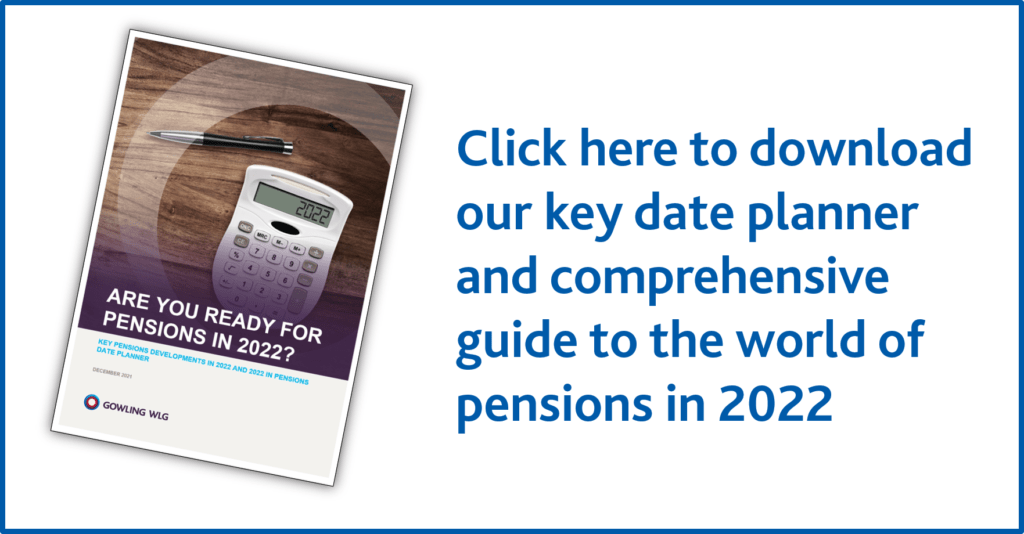In 2022, the DWP and TPR were expected to publish final regulations and guidance respectively on a new approach to funding defined benefit schemes. Recently, however, the DWP published a blog post stating that it will take time to develop its revised code of practice on DB funding. As a result, the second consultation on its revised code of practice will be published in late summer 2022 rather than in spring 2022.
This delay could have an impact on the timing of when the funding regime goes into force. It remains possible that the new regime will come into force at the end of 2022. It does now seem more likely that it will be early 2023 before the new funding regime applies.
The Pension Schemes Act 2021 set out the legal framework permitting a new scheme funding regime. The detail for the new regime will, however, be set out in:
- secondary legislation; and
- a revised code of practice on defined benefit scheme funding.
Under the new regime, trustees will need to:
- determine a scheme-specific funding and investment strategy (also referred to as the ‘long term objective’);
- have a written statement setting out their strategy; and
- submit a version of the statement of strategy signed by the chair of trustees to TPR.
What will the scheme-specific funding and investment strategy require?
The funding and investment strategy must state the funding levels the trustees intend to achieve by certain “relevant date(s)” and what investments the scheme will hold at those relevant dates. Regulations will set out:
- the principles the trustees must consider when determining the funding and investment strategy;
- the level of detail required in the funding and investment strategy; and
- the ‘relevant date(s)’ and how often the funding and investment strategy must be reviewed/revised.
Defined benefit schemes already have a Statutory Funding Objective, which requires the scheme to have sufficient and appropriate assets to meet its technical provisions as set by the scheme actuary. Once the trustees have adopted a funding and investment strategy, the technical provisions must be consistent with the funding and investment strategy (and should be amended if necessary to ensure consistency).
What is the statement of strategy?
Trustees will also be required to issue a ‘statement of strategy’ to TPR as soon as reasonably practicable after deciding the funding and investment strategy. TPR will have the power to direct trustees to amend the funding and investment strategy.
The statement of strategy will have to set out the funding and investment strategy and:
- an analysis of the extent to which the funding and investment strategy is being successfully implemented (along with any steps needed to remedy any unsuccessful areas);
- the main risks faced (and how these are being mitigated); and
- the trustees’ impressions of any major decisions taken in relation to the funding and investment strategy.
Trustees will have to consult with sponsoring employers when preparing the statement, and regularly review it. The format, content and review periods for the statement and how often it must be sent to TPR (including the extent to which it must be included in scheme valuations and recovery plans when these are sent to TPR) will be set out in regulations.
The statement will need to come from the Chair of the trustees. If the trustees do not have a Chair they must appoint one for this purpose.
Failure to prepare a funding and investment strategy and statement could result in a fine of up to £50,000.
How is TPR’s code of practice on DB funding changing?
TPR will produce a new code of practice on DB scheme funding. This is expected to focus on a long-term view when setting the scheme funding objective. TPR will include a description of how the Scheme Funding Objective should be set in the context of a long-term objective.
Trustees will be required to report in the triennial valuation process how they have used the long-term objective to inform the scheme’s technical provisions and recovery plan. It is also expected that TPR will set out clearer funding standards that focus on ‘prudence’ and ‘appropriateness’. These are intended to better balance employer commitments with risks to members and the PPF.

About the author(s)
Ian is a London-based professional support lawyer (PSL) legal director. Ian is a member of our pensions and combined human resource solutions (CHRS) teams. He works with clients to solve their employment and pensions law issues. Ian maintains a particular focus on 'crossover' issues that benefit from his understanding of both areas of law.

